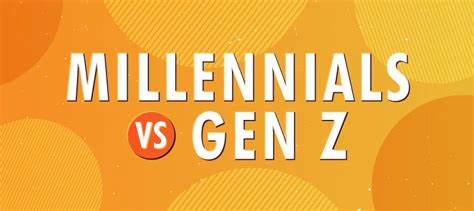The lines between Millennials and Gen Z often blur in memes and marketing campaigns—but when it comes to how they spend, save, live, and plan for the future, the differences are sharp and revealing.
Born roughly between 1981 and 1996, Millennials entered adulthood during a time of rapid technological change, a major recession, and the rise of social media. Gen Z, born from 1997 to around 2012, has been shaped by digital saturation, economic disruption, and growing climate anxiety.
Here’s a deep look at the forces shaping their behaviors—and what it means for the future of consumer trends, housing, work, and culture.
1. Spending Priorities: Value vs Experience
Millennials came of age believing in the “experience economy.” They prioritized travel, dining out, and live events—often fueled by credit and justified with the belief that life is short. Owning things mattered less than doing things. But as they’ve entered their 30s and 40s, many are now rethinking their spending in favor of stability and long-term goals like buying a home or saving for their kids.
Gen Z, in contrast, is starting out more pragmatic. They’re financially cautious, born into a post-2008 world and shaped by the student debt crisis, climate fear, and a global pandemic. They crave experience, too—but they want it fast, cheap, and ethically sourced. Shopping secondhand, using discount codes, and waiting for TikTok reviews are part of the ritual.
The Bottom Line:
Millennials splurged on experience. Gen Z shops with intention—and a tight budget.
2. Tech Habits: Adaptors vs Natives
Millennials witnessed the birth of social media. They remember the sound of dial-up and the first iPhone. They’re fluent in tech but not dependent on it. They use Instagram to share curated moments and still value the in-store shopping experience, especially for big purchases.
Gen Z, on the other hand, never knew a world without smartphones. Their lives are online by default. TikTok, YouTube, and Discord are where they discover products, learn skills, and form opinions. Online shopping isn’t just convenient—it’s second nature. If your brand doesn’t show up on their feed, you might as well not exist.
The Bottom Line:
Millennials saw tech evolve. Gen Z is the evolution—and their expectations for digital experiences are sky-high.
3. Housing and Independence: Delayed or Redefined?
Millennials were crushed by the 2008 housing collapse. Many delayed buying homes, having kids, or even moving out. Renting became the norm, and homeownership—once seen as a rite of passage—became an elusive dream. Co-living, long-term roommates, and urban migration defined their 20s and 30s.
Gen Z is facing an even tougher housing market, with skyrocketing rents and shrinking affordability. But they’re less hung up on traditional timelines. Many are staying with their parents longer (without the stigma Millennials felt), exploring alternative lifestyles, or embracing van life, communal housing, or digital nomadism.
The Bottom Line:
Millennials delayed traditional milestones. Gen Z is rewriting the script entirely.
4. Work and Income: Loyalty vs Leverage
Millennials chased corporate stability—until it betrayed them. Many stayed in jobs for years, hoping for raises or promotions that didn’t come. Hustle culture was born, and burnout wasn’t far behind.
Gen Z isn’t waiting around. They want flexibility, fast growth, and purpose. If a job doesn’t offer that, they’ll jump ship. Side hustles, creator income, gig work, and freelance platforms give them leverage. For Gen Z, identity isn’t defined by a job title—it’s a portfolio of interests, skills, and brands they build for themselves.
The Bottom Line:
Millennials played the long game. Gen Z plays to win now—and on their terms.
5. Brand Loyalty and Ethics: Aspiration vs Accountability
Millennials were the first to demand more from brands—sustainability, ethics, social impact. They wanted to shop with companies that shared their values, but brand image and trend still held sway.
Gen Z takes that further. They don’t just want brands to say the right things—they want proof. A mismatch between message and action can get a brand canceled overnight. They support small businesses, shop secondhand, and rally around brands that are inclusive, transparent, and bold.
The Bottom Line:
Millennials rewarded purpose-driven brands. Gen Z demands receipts—and impact.
6. Financial Habits: Trial-and-Error vs Early Empowerment
Millennials often stumbled into personal finance. Many weren’t taught how to budget or invest, leading to debt, poor credit, and delayed savings. They’ve learned hard lessons, and many are now focused on long-term financial wellness.
Gen Z is learning early. Thanks to YouTube, TikTok, and a flood of financial apps, they’re investing younger, budgeting smarter, and building credit from the jump. They’re more likely to use fintech tools, follow money influencers, and take advantage of online resources their parents never had.
The Bottom Line:
Millennials figured money out late. Gen Z is learning fast—and applying it early.
Final Thoughts
Millennials changed the world of work, spending, and culture. Gen Z is changing the rules.
Where Millennials chased belonging and aspiration, Gen Z demands authenticity and control. Where Millennials were early adopters, Gen Z is the benchmark. For brands, employers, and policymakers, understanding these generational shifts isn’t just helpful—it’s essential.
Both groups are navigating a world that feels more uncertain than ever. But their responses to that uncertainty are telling: one with hopeful hustle, the other with strategic realism.
